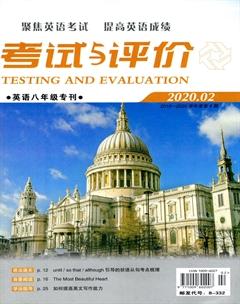Unit 4词汇要点讲解
李天雨
1. communicate v. 沟通,通信,通讯
She and I don't communicate any more. 我和她不再通信了。
communicate with sb. 表示“与某人交流”。
People can communicate with each other freely on the Internet. 人们可以在互联网上自由交流。
【拓展】 communication n. 交流,沟通
Students should come with better preparation and better communication skills. 学生应做好更充分的准备,具备更好的沟通能力。
2. allow v. 允许,让
If you allow me, I will send you back. 如果你同意,我就送你回去。
【拓展】常用结构:allow sb. to do sth. 允许某人做某事;allow doing sth. 允许做某事;be allowed to do sth. 被允许做某事
His parents allowed him to stay out late. 他的父母允许他在外面待到很晚。
Our teacher does not allow cheating to go unpunished. 我们的老师不容许欺骗行为不受到惩罚。
Smoking is not allowed in the hall. 大厅里禁止抽烟。
【拓展】 使役动词let和make也可以表示“让某人做某事”。使役动词后接动词原形作宾语补足语,但是当变为被动语态时需要加上不定式符号to,即be let to do sth., be made to do sth.。
Mom often makes her child do the homework all day. 妈妈经常让孩子一整天做作业。
She is made to follow the rules. 她被迫遵守这些规定。
3. argue v. 争论,争吵
My brothers are always arguing. 我的兄弟们总是争论不休。
【拓展】 argue with sb. 与某人争吵;argue about sth. 就某事争论
Mary often argues with her mother about which clothes to wear. 玛丽经常和她妈妈争论穿什么衣服。
They were arguing about the matter again. 他们又在争论这件事了。
4. offer v. 提供,自愿给予
He offered $4,000 for the car. 他出价四千美元买这辆汽车。
【拓展】 (1) offer表示“提供”时,作双宾语动词,常用的结构为:offer sb. sth.相当于offer sth. to sb.“为某人提供某物”。
The restaurant offers free coffee to customers. 餐厅为顾客提供免费咖啡。
=The restaurant offers customers free coffee.
(2) offer to do sth.“主动提出做某事”。
The kind man offered to help the old lady across the road. 那个好心人主动帮助老太太过马路。
5. compete v. 比赛,竞争
He's hoping to compete in the London marathon. 他期盼着参加伦敦马拉松比赛。
【拓展】 (1) compete with意为“与……竞争/对抗”,相当于compete against。
It is difficult for a small store to compete with / against a supermarket. 小商店很难与超市竞争。
(2) competition n. 比赛;竞争;competitive adj. 竞争的
6. elder n. 长者;长辈;元老;比……年长的人adj. 年纪较大的;资格老的;老练的
His elder brother is fifteen. He's younger than you. 他哥哥十五岁,比你小。
【拓展】 elder和older的区别
elder, older这两个词均是old的比较级,elder用来表示兄弟姐妹以及子女之间的长幼关系,常用作定语;older泛指新旧、老幼或者年龄大小的关系,可以用作表语或者定语。
(1) elder表示“前辈的,年纪较长的”,仅用于同一家庭成员的比较;older则不限于此。
My younger son is five and my elder son is nine. 我的小儿子5岁,大儿子9岁。
Tom is two years older than me. 汤姆比我年长两岁。
(2) elder在句中只用作定语,不作表语;older兩者皆可。
My elder sister does her homework all by herself. 我的姐姐独自做作业。
I think his mother is older. 我认为他的母亲年龄比较大。
(3) elder只能用来指人;older既可修饰人,也可修饰物。
My elder brother joined the army when he was only fifteen. 我哥哥年仅15岁就参了军。
This dog is older than any other dogs here. 这条狗在这里是最老的一条。
(4) elderly是形容词,意为“较老的,上了年纪的”。
She is very busy caring for two elderly relatives. 她在忙着照顾两个年老的亲戚。
7. compare v. 比较
They are always comparing their children with other children. 他们总是把自己的孩子和其他孩子相比。
【拓展】 compare常用结构:compare... with... 把……同……比较;compare... to... 把……比作……。
Don't compare your children with others'. 别把你的孩子和别人的相比。
We often compare the little kids to the flowers of the motherland. 我们经常把小孩子比作祖国的花朵。
8. work out
work out意为“解决,成功地发展”。
I hope the project can work out fine. 我希望这个项目能顺利发展。
【拓展】常见“动词+out”的短语搭配:point out指出;turn out 结果是;go out出去;give out 分发,发放;find out 查明;run out 用完;try out 试用,试验;take out 取出,掏出。
9. so that
so that与so... that都可以引导状语从句,so that引导目的状语从句,意为“为的是,结果是”,so... that引导结果状语从句,意为“如此……以致……”。
They may be able to help with childcare so that you can have a break. 他们可以帮忙照料孩子,这样你就可以歇一歇了。
He was so young that he couldn't go to school. 他年龄太小不能去上学。
【随堂检测】
一、根据汉语提示补全单词。
1. Is there anything ___ (有毛病) with the TV?
2. —How many girls are there in your school?
—I'm not sure. I ___ (猜测) there may be about 560.
3. I like the car very much, but I don't have
___ (足够的) money to buy it.
4. It's not a big ___ (重要的事) for me. I can find another job.
5. He doesn't ___ (允许) anyone to smoke here.
二、用所给单词的适当形式填空。
1. We are going to watch a basketball game instead of ___ (stay) at home this afternoon.
2. I can't hear you ___ (clear). Please speak louder.
3. The students are ___ (worry) about their school grades.
4. Parents shouldn't give their children so much ___ (press).
三、根据汉语意思完成句子,每空一词。
1. 你应该好好学习,以便能进入一所好的高中。
You should study hard ___ ___ you can get into a good high school.
2. 在我看来,他是一个勤奋的学生。
___ ___ ___, he is a hard-working student.
3. 现在我妈妈正在浏览报纸。
My mother is ___ ___ the newspapers at the moment.
4. 请把没有必要的句子删除。
Please ___ ___ the unnecessary sentences.
5. 這位作家直到获了奖才出名。
The writer ___ famous ___ he won the award.

